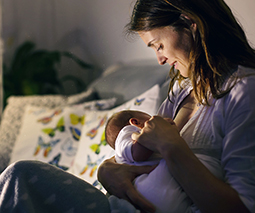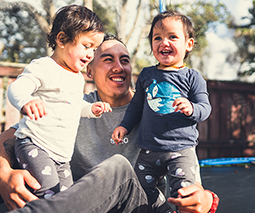What to do when a relationship stops feeling ‘right’

In any story of relationship breakdown, there’s always a moment where someone recalls things have ‘stopped feeling right.’
“It feels like it came out of the blue”
Given the significance of this feeling, it’s a wonder we don’t have more words to describe it. Perhaps it’s best understood as our gut instinct kicking in, and it’s usually triggered by witnessing a distinct change in our partner’s behaviour. For example, not calling to check in when they normally would, coming home late, lying, secretive behaviour, coldness, or just spending unusual amounts of time on the phone.
In long-term relationships with small children involved, these behaviours (and our gut instinct) can be slower to kick in. Exhaustion and routine can muffle our perception and our responses so that if a relationship breaks down, it often feels like it came out of the blue.
This also explains the stories of women (and men) recalling some time after the relationship has ended, that they were aware of changes in a partner’s behaviour before the relationship breakdown. It just took some time to realise it. Hindsight, hey?

So your relationship has stopped feeling ‘right’?
So what can you do if you feel like your partner is acting strange, or the comfortable familiarity of your relationship has stopped feeling ‘right’?
Child development expert Karen Young of Hey Sigmund says these feelings of suspicion or anxiety in regard to your relationship don’t always indicate the worst-case scenario.
“We always view the world through our own filters – which means we can really easily put a meaning on our partner’s behaviour which is more to do with what’s happening in us than in our partner,” says Karen.
“Sometimes, of course, we can be spot on about what’s happening because the facts are clear – lying, not returning calls, not where they are meant to be, nastiness, disrespect.”
And while our suspicions may lead to us deciding there is another person involved, Karen says it’s equally possible and in fact, quite likely, that an emotional disconnect or distance is really causing the mess.
How to repair emotional disconnection
Kirsty Levin is a psychologist and co-founder of The Parents Village. She says the stress of young family life has a lot to answer for when it comes to the breakdown of long-term relationships.
Kirsty explained that if a woman is feeling suspicious or uncomfortable, the best approach is to take a step back and try and make a plan without too much emotion. Here are four steps to help you do that.
1. Take a deep breath and try and take a lateral view
“Take some time to reflect on the situation,” says Kirsty. “Ascertain the facts and distance yourself from your initial emotional reaction. Try to understand what is causing or driving this change in behaviour and what they might be getting out of it.
“For example, is your partner staying out late with his friends more because he needs to relax? Is it relieving anxiety, or is he avoiding responsibility? Each one of these possibilities requires a different conversation and the only way you can get to the bottom of it, is to ask.”

2. Don’t wait to talk things out – but be gentle
“Questioning your partner’s words, or feeling suspicious of their behaviours – it can lead to deep-seeded anger, distrust, and resentment if it’s not dealt with in time,” says Kirsty.
But before you launch into an attack or list your suspicions, Kirsty advises asking your partner how they are going generally.
“Ask if there anything bothering them. Are they happy or satisfied with the status quo? Do they feel loved or appreciated by you? Encourage your partner to respond honestly and try to reserve judgement or reaction until you have heard them out. If it feels like drawing blood from a stone, or you get the classic, ‘I’m fine’ response, then you may need to broach it more directly.”
Kirsty also recommends talking out your concerns outside the relationship, with a trusted party – particularly if your initial conversation with your partner didn’t go as planned.
“Whether it’s a family member, friend or a therapist, they may help you to see the issues in a different way, to ask different questions, and to separate yourself from the immediate emotional response. Try to also assess how important the issue is to you, versus your partner, versus the importance of the issue in the whole relationship.”
3. Choose your timing carefully
Nobody feels like talking about matters of the heart when they’re exhausted or feeling under the pump. But finding this time as parents with young children can be tricky.
Kirsty recommends choosing a time of day when you are both at your freshest or when your baby/children are fed and settled or being looked after by family/friends.
“Avoid doing this right before bed or first thing in the morning during the working week when everyone is rushing around to get out the door,” says Kirsty.
4. Use positive language
Again this comes back to making a solid plan. For some people, actions speak louder than words.
“Encourage change in your partner by showing your partner how you’d like to be treated, touched and spoken to, rather than telling. Use positive language rather than negatives and blaming – for example, ‘I’d really love it if we could spend more quality time together’ rather than, ‘I hate that you go out all the time with your mates’.”
Remember: It takes two people to heal a relationship
In most cases, open communication can be enormously healing for a relationship and make things better than they were before. But according to Karen Young, this kind of change is only possible when both partners express a willingness to fix the relationship and do whatever is required to get back on track.
“If you work on things together – as in both people working hard on the relationship – there is hope of healing. But if you feel as though you’re the only one who is fighting for the relationship, or open to how to make it work for both of you, that’s the time to ask whether this relationship is better for you than it is bad.”
For women who feel like they’re battling uphill with very little result, Karen says the next most important step is to “know when you’re done.”
“Give it what you’ve got … but staying in a broken relationship can slowly grow the hurt and the breakage so much, that when it finally ends, it becomes difficult to have a civil, workable relationship. If you have children, it will be important to maintain a level of respect that makes co-parenting possible.
“Fighting for someone who is not fighting to hold onto you is exhausting and diminishing. It hurts over and over.”
 Need some support to be the best parent you can be? Our Parent School parent coaching experts can help. Click to find out more or book a one-on-one session.
Need some support to be the best parent you can be? Our Parent School parent coaching experts can help. Click to find out more or book a one-on-one session.









